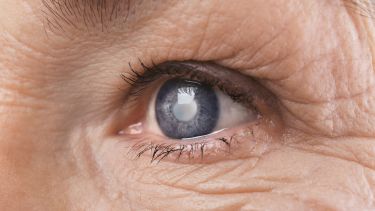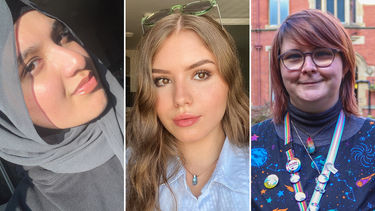Sight loss affects over 2 million people in the UK, with 80% of those affected aged 65+. This age group makes up two thirds of acute hospital admissions, and it’s not currently known how visual impairment impacts patients’ experience of acute care or how best to support these patients during a hospital stay.
Dr Fiona Wilson and Dr Gemma Arblaster from the School of Allied Health Professions, Nursing and Midwifery collaborated with Sheffield students and participants from the Sheffield Royal Society for the Blind to explore their lived experiences of acute hospital care through workshops and interviews. The researchers then co-produced resources for clinical staff and vision impaired people (VIP) to improve both awareness and support of their needs.
Four second year nursing students - Nicola Jackson, Elena Starsong, Sydney Graveling, and Zaina Qamar - alongside a first year orthoptics student Zahra Hussain and second year speech and language student Elliot Rook, were involved throughout the duration of the project. PhD student Holly Geraghty designed the final accessible resources to be used by clinicians and vision impaired people.
The research was funded by the university’s Participatory Research Network (PRN), a cross-faculty initiative which promotes the idea of carrying out meaningful research with - rather than on - communities. This collaborative project not only allowed participants' voices to be heard, but gave undergraduate students the opportunity to take part in research early on in their academic careers.
Elena Starsong, Nursing (Adult) student, said: “I’ve always been really interested in qualitative research but I was particularly drawn to the participatory aspect of this project. I am visually impaired so the topic itself was very familiar to me. I wanted to do the project to gain some experience and insight into the practicalities of doing research in health, while contributing to a project that will hopefully start to change the experiences of visually impaired people in hospital.”
As well as facilitating workshops with participants, students had the opportunity to transcribe interviews and analyse qualitative data to identify key themes such as ‘feeling invisible’, ‘being dis-abled’ and ‘staff awareness’. The research team went on to produce two informational posters titled “Hello! I’m here!”, offering advice and ‘top tips’ to hospital staff and visually impaired people. This study is very much ongoing, with new opportunities like 360 video learning resources in the works to encourage greater awareness of the needs of people with visual impairments.
I was very surprised by how much we as undergraduates were involved and I found it both an honour and a pleasure to work with the participants and share their stories.
Zahra Hussain
BMedSci Orthoptics student
Jane Peach, Marketing Manager, Sheffield Royal Society for the Blind added: “As a local charity, Sheffield Royal Society for the Blind (SRSB) and Rotherham Sight & Sound (RSS) work hard to raise awareness of issues and challenges that our clients face. We collaborate with various organisations and this includes being involved in consultations and focus groups on a variety of issues.
“One of the most recent research groups was about hospital in-patient experience with the University of Sheffield. The aim was to explore and understand how visual impairment can impact on inpatients during a hospital stay. It was very productive and we are delighted that through our group’s feedback and the facilitators’ implementation, the result is some very helpful information in the form of guidance for both patients and staff. Our thanks to the team for consulting with us - it has resulted in something very powerful that will hopefully make a big difference.”
Dr Fiona Wilson, Lecturer in the School of Allied Health Professions Nursing and Midwifery, said: “Despite being constrained by their course placements and workload, the students all contributed positively to the study, and told us how valuable they found this research experience. Zaina Qamar, a second year undergraduate student at the time, even came along with me to the British Society of Gerontology to co-present our findings in July 2023 - which is quite commendable given the academic nature of the event.
“Just as importantly the experience has enabled our students to understand the perspectives of patients with VIP and how to best meet their needs during future practice. Sharing a patient’s vision impairment in handovers, keeping their belongings in easy reach, and being aware of the hospital’s assistance dog policy will all help VIP patients feel safe, understood and comfortable.”


